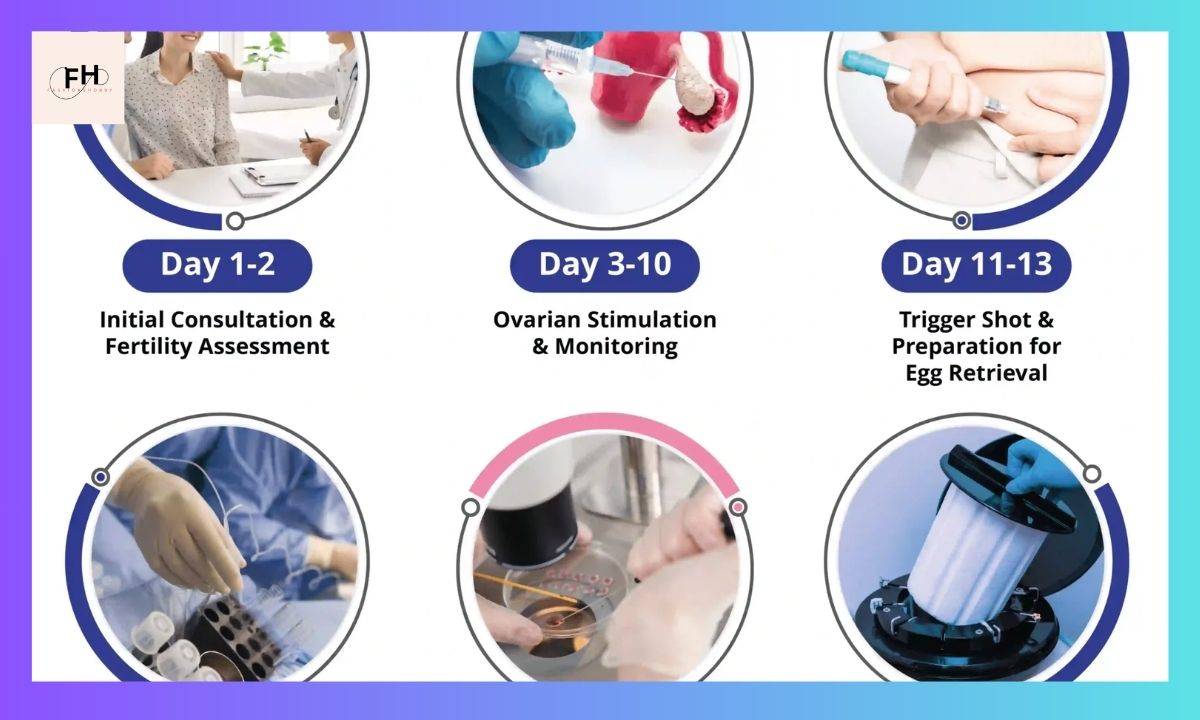The journey of Lifestyle Adjustments For Egg Freezing requires careful planning and lifestyle modifications to optimize success rates and ensure a smooth experience. This comprehensive guide covers essential adjustments before, during, and after the procedure.
Before the Egg Freezing Process
The preparation phase is crucial for optimizing egg quality and quantity. Making specific lifestyle changes 3-6 months before starting the process can significantly impact outcomes.
Dietary Modifications
Your diet plays a vital role in reproductive health and egg quality. Focus on these key aspects:
- Increase protein intake through lean meats, fish, and plant-based sources
- Consume antioxidant-rich foods like berries and leafy greens
- Add fertility-supporting nutrients through whole grains and nuts
- Reduce processed foods, refined sugars, and artificial additives
- Consider Mediterranean diet principles for optimal reproductive health
Exercise Adjustments
Maintaining the right balance of physical activity is essential:
- Continue moderate exercise like walking, swimming, or yoga
- Avoid high-intensity workouts that could stress your body
- Focus on strength-maintaining rather than building
- Listen to your body and adjust intensity as needed
- Implement gentle stretching routines for flexibility
Stress Management
Reducing stress levels can positively impact hormone balance:
- Practice daily meditation or mindfulness exercises
- Incorporate breathing techniques
- Consider joining support groups
- Schedule regular relaxation activities
- Maintain work-life balance
Sleep Optimization
Quality sleep supports hormone regulation and overall health:
- Establish a consistent sleep schedule
- Create a relaxing bedtime routine
- Maintain a cool, dark sleeping environment
- Aim for 7-8 hours of uninterrupted sleep
- Limit screen time before bed
Work Schedule Planning
Prepare your professional life for the upcoming procedure:
- Inform necessary supervisors about medical appointments
- Plan for potential time off during the process
- Arrange flexible working hours if possible
- Set boundaries for work-related stress
- Create a backup plan for important projects
During Hormone Stimulation
This phase requires specific attention to daily routines and physical activities.
Activity Restrictions
Follow these guidelines to ensure safety during stimulation:
- Avoid high-impact exercises
- No twisting or jarring movements
- Limited lifting (nothing over 10 pounds)
- Modified yoga or stretching only
- Walking is encouraged for circulation
Nutrition Requirements
Proper nutrition supports your body during stimulation:
- Increase protein intake to 60-80 grams daily
- Focus on easily digestible foods
- Add electrolyte-rich beverages
- Maintain balanced meals
- Consider fertility-specific supplements
Hydration Needs
Proper hydration is crucial during this phase:
- Drink 2-3 liters of water daily
- Monitor urine color for hydration
- Incorporate electrolyte drinks
- Avoid excessive caffeine
- Track daily fluid intake
Read This Blog: women’s health and wellness lifestyle program
Medication Schedule Management
Maintaining precise timing for medications:
- Set multiple daily alarms
- Create a medication tracking system
- Organize supplies efficiently
- Keep backup medications available
- Document each dose taken
Emotional Support
Emotional well-being is essential during this time:
- Connect with support groups
- Maintain open communication with loved ones
- Consider counseling services
- Practice self-compassion
- Journal your experience
Recovery Period
Post-procedure care is crucial for optimal healing.
Physical Limitations
Understanding your body’s needs during recovery:
- Rest for 24-48 hours post-procedure
- Avoid strenuous activities
- Listen to body signals
- Take prescribed pain relief
- Monitor for complications
Rest Requirements
Proper rest aids recovery:
- Take adequate time off work
- Maintain light activities only
- Prioritize sleep quality
- Allow for afternoon rest
- Create a peaceful environment
Return to Exercise Timeline
Gradual return to physical activity:
Week 1:
- Light walking only
- Gentle stretching
- No lifting
Week 2:
- Increased walking distance
- Light yoga
- Modified daily activities
Week 3-4:
- Gradual return to regular exercise
- Monitor body response
- Adjust as needed
Nutritional Considerations
Post-procedure dietary needs:
- Focus on anti-inflammatory foods
- Maintain high protein intake
- Include fiber-rich foods
- Stay hydrated
- Consider supplements as recommended
Read This Blog: Watch Every Moment from Glamour’s 2024 Women of the Year Red Carpet
Follow-up Care
Maintaining proper medical oversight:
- Attend all scheduled follow-ups
- Report any concerns promptly
- Keep detailed recovery notes
- Monitor physical changes
- Stay in contact with medical team
Daily Routine Modifications
Adjusting daily life to accommodate the process.
Work Accommodations
Professional life adjustments:
- Flexible scheduling when possible
- Remote work options
- Modified duties if needed
- Communication with supervisors
- Stress reduction strategies
Social Life Adjustments
Balancing social activities:
- Modify social commitments
- Communicate boundaries
- Choose appropriate activities
- Maintain support connections
- Plan quiet social gatherings
Self-care Practices
Essential self-care during the process:
- Regular relaxation time
- Gentle beauty treatments
- Stress-reducing activities
- Mental health check-ins
- Personal time allocation
Support System Engagement
Utilizing available support:
- Family involvement
- Friend support networks
- Professional counseling
- Support groups
- Online communities
Time Management
Efficient scheduling strategies:
- Priority setting
- Calendar organization
- Appointment tracking
- Buffer time allocation
- Regular schedule reviews
Long-term Planning
Considering future implications and preparations.
Health Monitoring
Ongoing health maintenance:
- Regular check-ups
- Hormone level monitoring
- General health screening
- Lifestyle assessment
- Preventive care
Future Fertility Considerations
Planning for potential future use:
- Timeline discussions
- Family planning options
- Medical consultations
- Storage facility research
- Legal considerations
Insurance and Financial Planning
Managing financial aspects:
- Coverage verification
- Payment planning
- Future cost considerations
- Savings strategies
- Insurance options
Mental Health Support
Long-term emotional well-being:
- Regular counseling
- Stress management
- Anxiety reduction
- Depression screening
- Relationship support
Relationship Impacts
Managing relationship dynamics:
- Partner communication
- Family discussions
- Support expectations
- Future planning
- Emotional sharing
Medical Considerations
Important medical aspects to monitor.
Medication Timing
Precise medication management:
- Injection schedule
- Medication storage
- Timing accuracy
- Supply management
- Emergency backup
Doctor Appointments
Managing medical visits:
- Regular scheduling
- Preparation requirements
- Question documentation
- Result tracking
- Follow-up planning
Monitoring Requirements
Ongoing health checks:
- Hormone levels
- Ultrasound monitoring
- Physical examinations
- Blood work
- Progress tracking
Side Effect Management
Handling potential side effects:
- Symptom tracking
- Relief measures
- Communication with doctors
- Emergency contacts
- Comfort measures
Emergency Protocols
Being prepared for emergencies:
- Contact numbers
- Warning signs
- Action plans
- Hospital locations
- Documentation needs
Frequently Asked Questions
What is the optimal time to start egg freezing?
The ideal age range is typically between 25-35 years, when egg quality and quantity are optimal.
How long does the entire process take?
The stimulation phase typically lasts 10-14 days, with the entire process taking about 2-3 weeks.
Can I work during the process?
Most women can continue working during the process, though flexibility around appointments is helpful.
What are the most common side effects?
Common side effects include bloating, mood changes, and mild discomfort at injection sites.
How soon can I resume normal activities?
Most women can return to normal activities within 3-5 days after the egg retrieval procedure.
Conclusion
Egg freezing is a significant medical journey that requires careful attention to lifestyle adjustments and planning. Success rates can be optimized through proper preparation, adherence to medical guidance, and maintaining a balanced lifestyle throughout the process.
The key to a smooth experience lies in understanding and implementing these adjustments while maintaining strong support systems and open communication with medical providers. Remember that each person’s journey is unique, and flexibility in adapting these guidelines to individual circumstances is essential.





